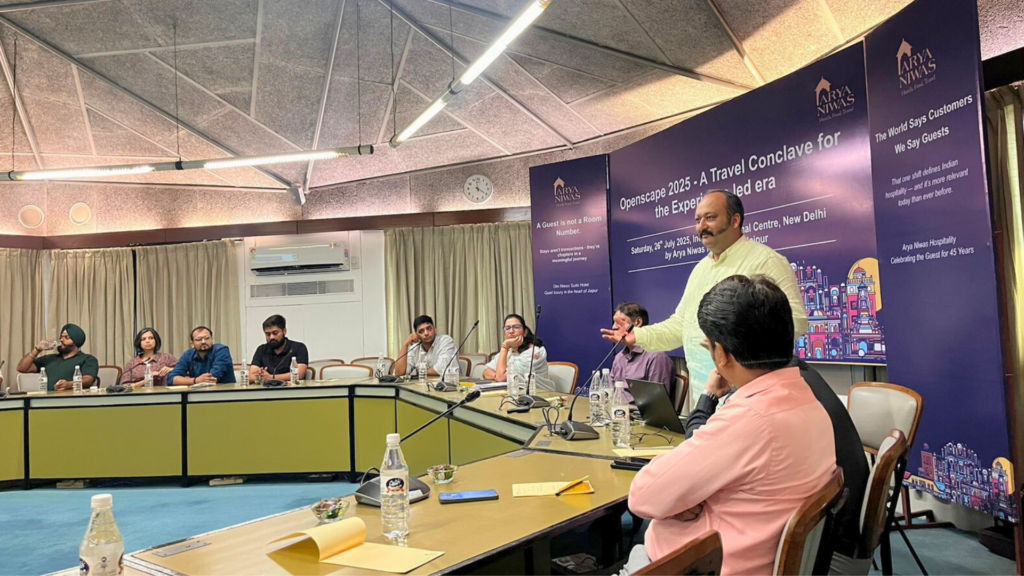AI in Travel
Elderly Travelers Falling Victim to AI-Generated Deepfake Scams, How Technology is Deceiving Seniors and What You Can Do to Protect Yourself

Thursday, July 24, 2025
Elderly travelers are increasingly falling victim to AI-generated deepfake scams, as technology continues to deceive seniors with increasingly convincing fraudulent content. These scams use advanced AI tools to create hyper-realistic videos and images, making it almost impossible for victims to distinguish between what’s real and what’s fabricated. In many cases, seniors are lured into booking trips to non-existent destinations or engaging with fake experiences, only to arrive and find nothing but disappointment.
As AI technology becomes more accessible and sophisticated, these scams are becoming more prevalent, targeting those who may not be familiar with the complexities of online fraud. The rise of deepfake technology means that even familiar faces and voices can be convincingly mimicked, adding an extra layer of deceit. For elderly travelers, this is a particularly dangerous development, as they are often more trusting and less equipped to identify these kinds of scams.
It’s crucial for both the victims and their loved ones to understand how AI-generated deepfakes work and how to protect against them. With more awareness and careful planning, elderly travelers can reduce their chances of being deceived by these fraudulent schemes. This article will explore the rising issue of AI deepfake scams, how technology is targeting seniors, and the steps you can take to ensure a safe and secure travel experience for yourself or your loved ones.
The Rising Threat of AI-Generated Travel Scams Targeting Seniors
In recent months, a disturbing trend has emerged where elderly travelers are being duped by sophisticated AI-generated deepfake videos that promote non-existent vacation destinations. These scams use advanced artificial intelligence to create hyper-realistic videos and images that portray beautiful, exciting travel locations—only for victims to arrive and find that the destinations were entirely fabricated. This new form of travel fraud is exploiting the digital illiteracy and trustful nature of older adults, causing significant financial and emotional harm.
As deepfake technology becomes more accessible, the risks for vulnerable populations, particularly seniors, grow. Scammers are using AI tools to manipulate visuals and voices to create convincing content that appears legitimate, making it challenging for victims to discern the truth. As the travel industry continues to recover from global disruptions, this new wave of deception is quickly becoming a major concern for both tourists and authorities.
How AI-Generated Scams Work: A Step-By-Step Breakdown
AI-generated scams in the travel sector typically start with a seemingly innocent online advertisement, email, or social media post. These communications feature highly convincing deepfake videos of pristine beach resorts, mountain retreats, or cultural landmarks, all designed to spark the curiosity of potential travelers. The AI technology used in these videos can simulate real travel experiences—complete with fabricated testimonials from “happy tourists,” stunning visuals, and unrealistic promises of deals.
The scam becomes particularly dangerous when seniors, who may not be as digitally savvy as younger generations, trust these videos and make bookings based on what they see. Once they’ve paid for the trip, they may travel to the advertised location, only to discover that the destination doesn’t exist or that it’s vastly different from what was promised.
This type of fraud has already led to significant financial losses for elderly travelers, many of whom are on fixed incomes and can ill afford such scams. With AI technology becoming more advanced, the danger of these fraudulent activities continues to grow, putting even more elderly travelers at risk.
Why the Elderly Are Targeted: The Perfect Storm for Scams
Seniors are particularly vulnerable to AI-generated travel scams due to several key factors:
Limited Digital Literacy: Many older adults are not as familiar with the nuances of online content, making them more likely to trust misleading or fabricated information. Scammers take advantage of this by crafting professional-looking websites and social media pages that can easily trick the unsuspecting viewer.
Trusting Nature: Older adults are often more trusting than younger individuals, which makes them more susceptible to scams. In the case of travel scams, they may not question the legitimacy of a seemingly authentic video or testimonial and are more likely to act on the information they see.
Emotional Manipulation: Scammers often target the emotions of seniors, especially those who may be longing for adventure or looking to make the most of their retirement years. The enticing visuals of a dream vacation can easily prey on these desires, leading victims to make quick decisions without verifying the authenticity of the offer.
These factors make seniors an ideal target for scams that exploit the very technology designed to deceive and manipulate.
Real-Life Scams: How AI Is Deceiving the Elderly
The Kuak Skyride Incident: One of the most notable cases involved a couple who watched an AI-generated video showcasing a cable car ride called the “Kuak Skyride.” Enticed by the breathtaking views and thrilling experience, the couple traveled hours to reach the location, only to find that the attraction was entirely fictional. This case highlights how deepfake videos can create fabricated experiences that seem too good to pass up.
The Belgian Romance Scam: In a different but related scam, a 76-year-old Belgian man was convinced by an AI-generated video that he was in a relationship with a woman who claimed to be a former Miss France. After months of online conversations and money exchanges, the man traveled to meet her, only to discover that he had been swindled. The AI-generated videos of the woman, along with fabricated emotional stories, tricked the man into sending money for what he believed was a real relationship.
The AI Voice Scam: More recently, AI technology has been used to simulate the voices of loved ones, tricking elderly individuals into thinking they are hearing from their grandchildren or children. One California senior received a call from what he believed was his son, claiming to be in a car accident and needing money for bail. The voice was entirely fabricated using AI, but the senior didn’t realize it until after he had sent the money. These types of scams are particularly dangerous, as they prey on the emotional connection seniors have with their families.
These examples demonstrate how deepfake technology is evolving and being used in increasingly sophisticated ways to exploit elderly individuals.
How to Protect Yourself from AI-Generated Travel Scams
While these scams are growing more advanced, there are several steps seniors can take to protect themselves from falling victim:
Verify Sources and Content: Always double-check the legitimacy of travel offers. Look for reviews, ratings, and official website listings. Be cautious if the video or content is coming from an unknown or suspicious source.
Avoid Clicking on Unsolicited Links: If you receive an email or message with a travel offer that seems too good to be true, avoid clicking on any links. Instead, visit the official website of the resort or travel agency directly to verify the information.
Consult with Family Members: Seniors should involve family members or trusted friends when booking travel or making major decisions, especially if the offer seems too enticing. Family can help verify the authenticity of the offer and spot potential red flags.
Educate Yourself About AI and Deepfakes: Staying informed about the latest technology scams, including how deepfakes work, can help seniors recognize fraudulent content. Resources like community centers, online tutorials, or trusted news outlets can help with digital literacy.
Report Suspicious Activity: If you think you’ve been targeted by an AI-generated scam, report it to the authorities immediately. Many countries have online fraud reporting systems to help track and prevent scams.
The Future of Travel Scams: What to Expect
As AI technology continues to improve, so too will the sophistication of travel scams targeting elderly individuals. Scammers are likely to develop even more convincing deepfake content, further blurring the lines between what’s real and what’s fake. This means that staying vigilant and educated about online fraud will become even more important for seniors.
The travel industry, too, must adapt to these emerging threats. Hotels, airlines, and tour companies should be proactive in educating their customers about potential scams and offer clear, easy-to-understand methods for verifying the legitimacy of offers. Additionally, increased regulation and collaboration between governments, tech companies, and law enforcement will be necessary to combat the rise of deepfake scams.
Protecting Elderly Travelers from Emerging AI Scams
AI-generated scams targeting elderly travelers are a growing concern, with deepfake videos being used to deceive and manipulate vulnerable individuals. These scams not only lead to financial losses but can also cause significant emotional distress. By staying informed and taking simple precautions—like verifying the legitimacy of travel offers and involving family members in major decisions—seniors can protect themselves from falling victim to these sophisticated frauds.
As deepfake technology continues to evolve, it’s crucial that both individuals and the travel industry take proactive steps to safeguard against these scams. With the right awareness and precautions, elderly travelers can continue to enjoy the joys of exploring new destinations without falling prey to fraudulent schemes.
AI in Travel
With focus on AI, sustainable travel Arya Niwas organises Openscapes 2025 in New Delhi

The opportunities and challenges that issues like artificial intelligence, sustainability and experiential travel pose to the tourism industry in India and overseas were highlighted at Openscapes 2025, a travel conclave in New Delhi on Saturday.
Organised by Arya Niwas, a hospitality group based in Jaipur, the conclave served as a participative platform to explore transformative ideas for the tourism sector, addressing pressing issues such as sustainability, experiential curation, the role of artificial intelligence (AI), and the integration of responsible practices into the travel experience.
Drawing stakeholders from across India’s hospitality industry, the conclave was organised with the core theme of Projecting India and Rajasthan with a stronger, more meaningful narrative.
“This is the first conclave. It is called Openscapes. We hope that we will be having more such dialogue-based conclaves on travel. There is a need for us to behave as one in the travel industry and to move forward together because the ultimate aim is to serve the guests and make the guests win,” Pooja Bansal, Owner and General Manager, Arya Niwas, told India & You on the sidelines of the event.
The urgency of the issues raised at the meeting was underscored by leading tour operators, who highlighted that Indian tourism, particularly in recent years, “has not been sustainable and things have gone really, really bad.”
The conclave drew stakeholders from across India’s hospitality industry
“When we talk about sustainability with experiential tourism, the experience at the grassroot level, meeting local people with a bit of sustainability, offers eye-opening encounters. Yet, there are challenges,” Navneet Arora, Managing Director, VINString Holidays, a travel agency in New Delhi, told India & You.
The meeting illustrated both obstacles and achievements in rural and urban experiential tourism. Operators cited instances where visitors’ immersion in heritage neighbourhoods and private homes fostered mutual pride among locals and tourists. However, they also warned against approaches that leave rural residents feeling like “monkeys in the zoo,” underscoring the necessity of responsible, respectful interaction, something now addressed by ensuring a share of tour proceeds benefit the communities involved. Sustainability, participants argued, extends well beyond eco-friendly rhetoric.
The conclave highlighted innovative tour formats, slow tourism, creative workshops and direct engagement with artisans, as pathways for deeper, more rewarding guest experiences.
“I think that is the call for the future, because automation has to come in. If we are not doing automation today, we are backwards. AI is important. The event opens up eyes for a lot of people. Difficult, but yes, AI and sustainability are important and doable,” Arora added.
“The interpretation of sustainability has become very cliché. This was a session to break that,” said Bansal.
Participants at the Openscapes 2025 called for a sustained dialogue, with suggestions for sector-wide conventions and targetted sessions on marketing and AI and more collaborative initiatives.
AI in Travel
Sabre Corporation’s Strategic Partnership with Christopherson Business Travel and Its Implications for Undervalued Cloud and AI Stocks

Sabre Corporation (NASDAQ: SABR) has long been a cornerstone of the global travel technology sector, but its recent strategic partnership with Christopherson Business Travel marks a pivotal evolution. By leveraging its AI-driven platform and cloud-native infrastructure, Sabre is not only modernizing corporate travel management but also positioning itself as a catalyst for growth in the undervalued travel tech sector. For investors, this collaboration offers a compelling case study in how AI and cloud innovation can unlock long-term value in a niche yet resilient market.
A Strategic Alliance for the Future of Corporate Travel
On July 17, 2025, Sabre announced a multi-year agreement to become Christopherson Business Travel’s primary technology partner. This partnership is more than a transactional arrangement—it’s a strategic alignment of two companies aiming to redefine corporate travel through automation, real-time data, and personalized service. Sabre’s AI-powered tools, including Sabre Red 360, Trip Proposal, and Market Intelligence, will streamline operations for Christopherson, enabling faster decision-making and enhanced client offerings.
The integration of Sabre’s cloud-native infrastructure into Christopherson’s proprietary Andavo platform is particularly noteworthy. This move allows for real-time orchestration of multi-source content (air, hotel, rail, ground) and seamless API-driven integrations, reducing manual effort and improving scalability. As Chad Maughan, CTO of Christopherson, noted, Sabre’s architecture provides the operational flexibility needed to adapt to evolving client demands—a critical advantage in the post-pandemic corporate travel landscape.
Sabre’s Financial Resilience and AI-Driven Growth
Sabre’s financial performance in 2024 underscores its transition from a turnaround story to a growth-oriented entity. Revenue increased to $3 billion, with adjusted EBITDA rising to $517 million—a 54% year-over-year improvement. While IT Solutions revenue dipped due to de-migrations, the Travel Solutions and Distribution segments grew by 4% and 6%, respectively, driven by demand for Sabre’s AI-powered tools.
The company’s market cap of $1.222 billion pales in comparison to AI/cloud giants like Databricks ($62 billion) or Snowflake ($43.6 billion), but this undervaluation reflects Sabre’s niche focus. Its strategic investments in Sabre Mosaic—a modular platform combining AI, cloud, and traditional agent workflows—position it to capture a larger share of the corporate travel market, which is projected to grow as businesses prioritize cost optimization and efficiency.
The AI/Cloud Travel Tech Opportunity
The broader travel tech sector is undergoing a transformation fueled by generative AI. According to Skift Research, AI-driven tools could create a $28 billion+ opportunity for the industry, with applications in personalized itineraries, dynamic pricing, and automated customer service. Sabre’s Automated Exchanges & Refunds and Agency Retailer solutions are already streamlining post-booking processes, reducing manual intervention by up to 70%.
However, Sabre is not alone in the race to monetize AI in travel. Competitors like C3.ai (NYSE: AI), Marvell Technology (NASDAQ: MRVL), and DigitalOcean (DOCN) are also leveraging cloud and AI to drive growth. C3.ai’s predictive analytics tools, for instance, have secured government contracts worth $450 million, while Marvell’s AI-optimized chips are powering data centers for hyperscale providers. Yet, Sabre’s deep vertical integration into travel-specific workflows gives it a unique edge in the corporate travel niche.
Why Sabre Is an Undervalued Investment
Despite its strategic advantages, Sabre remains overlooked by many investors. Its current price-to-earnings ratio (P/E) of 8.5 is significantly lower than the industry average of 18.5, and its hedge fund ownership (11.2%) suggests growing confidence in its AI-driven roadmap. The partnership with Christopherson is a validation of Sabre’s value proposition: it enables the company to scale its AI/Cloud offerings without overhauling existing systems, a critical factor for travel agencies seeking cost-effective modernization.
For investors, the key question is whether Sabre can replicate its success in other verticals. The company’s PowerSuite Cloud platform, which automates operations and integrates NDC content, is already gaining traction among mid-sized travel agencies. If Sabre can expand its footprint in the corporate and leisure travel markets, its revenue could outpace the 10% growth projected by analysts.
Conclusion: A Strategic Bet on AI-Driven Travel
Sabre’s partnership with Christopherson Business Travel is a microcosm of the broader shift toward AI and cloud-native solutions in travel technology. While the company may lack the valuation of tech giants like Microsoft or Google, its focus on vertical-specific innovation and operational efficiency makes it a compelling play for investors seeking exposure to the travel sector’s AI revolution.
For those considering a diversified portfolio, Sabre offers a unique blend of undervaluation and growth potential. However, it should be viewed as a complementary holding to broader AI/cloud stocks like C3.ai or Marvell, rather than a standalone bet. As the travel industry continues to embrace AI-driven automation, Sabre’s ability to deliver scalable, client-centric solutions will likely drive long-term value for both its partners and shareholders.
AI in Travel
AI Travel Tricks: Watch Out for the Road to Nowhere – Herald/Review Media

AI Travel Tricks: Watch Out for the Road to Nowhere Herald/Review Media
Source link
-

 Brand Stories6 days ago
Brand Stories6 days agoBloom Hotels: A Modern Vision of Hospitality Redefining Travel
-

 Brand Stories1 day ago
Brand Stories1 day agoCheQin.ai sets a new standard for hotel booking with its AI capabilities: empowering travellers to bargain, choose the best, and book with clarity.
-

 Destinations & Things To Do7 days ago
Destinations & Things To Do7 days agoUntouched Destinations: Stunning Hidden Gems You Must Visit
-

 AI in Travel7 days ago
AI in Travel7 days agoAI Travel Revolution: Must-Have Guide to the Best Experience
-

 Brand Stories3 weeks ago
Brand Stories3 weeks agoVoice AI Startup ElevenLabs Plans to Add Hubs Around the World
-

 Brand Stories2 weeks ago
Brand Stories2 weeks agoHow Elon Musk’s rogue Grok chatbot became a cautionary AI tale
-

 Destinations & Things To Do1 day ago
Destinations & Things To Do1 day agoThis Hidden Beach in India Glows at Night-But Only in One Secret Season
-

 Asia Travel Pulse3 weeks ago
Asia Travel Pulse3 weeks agoLooking For Adventure In Asia? Here Are 7 Epic Destinations You Need To Experience At Least Once – Zee News
-

 AI in Travel3 weeks ago
AI in Travel3 weeks ago‘Will AI take my job?’ A trip to a Beijing fortune-telling bar to see what lies ahead | China
-

 Brand Stories3 weeks ago
Brand Stories3 weeks agoChatGPT — the last of the great romantics













You must be logged in to post a comment Login